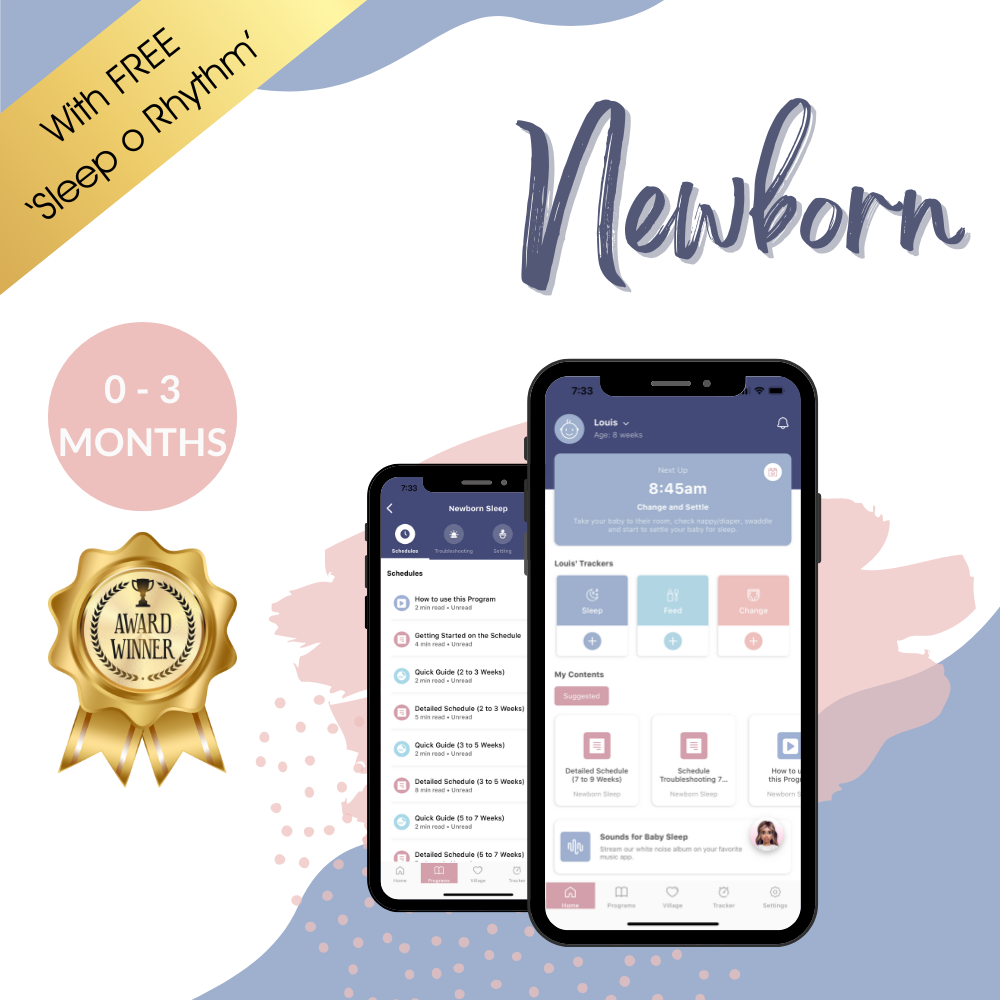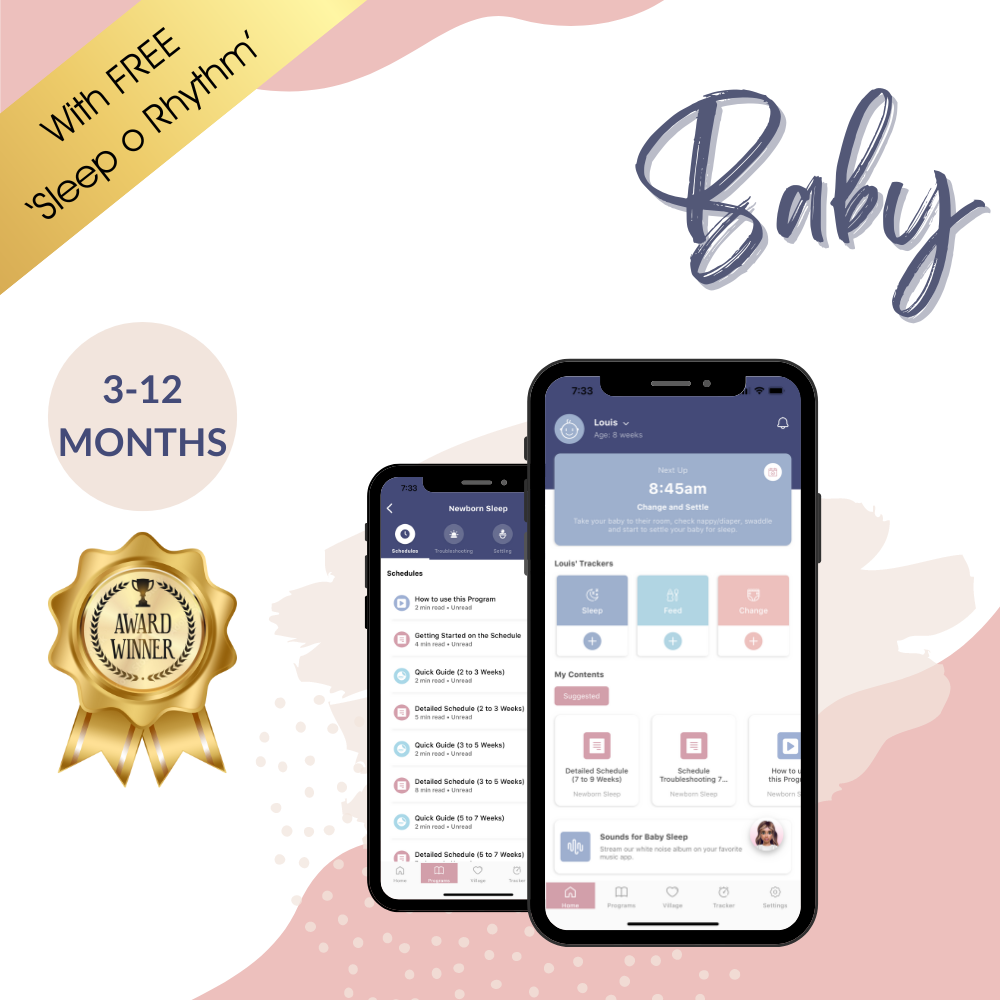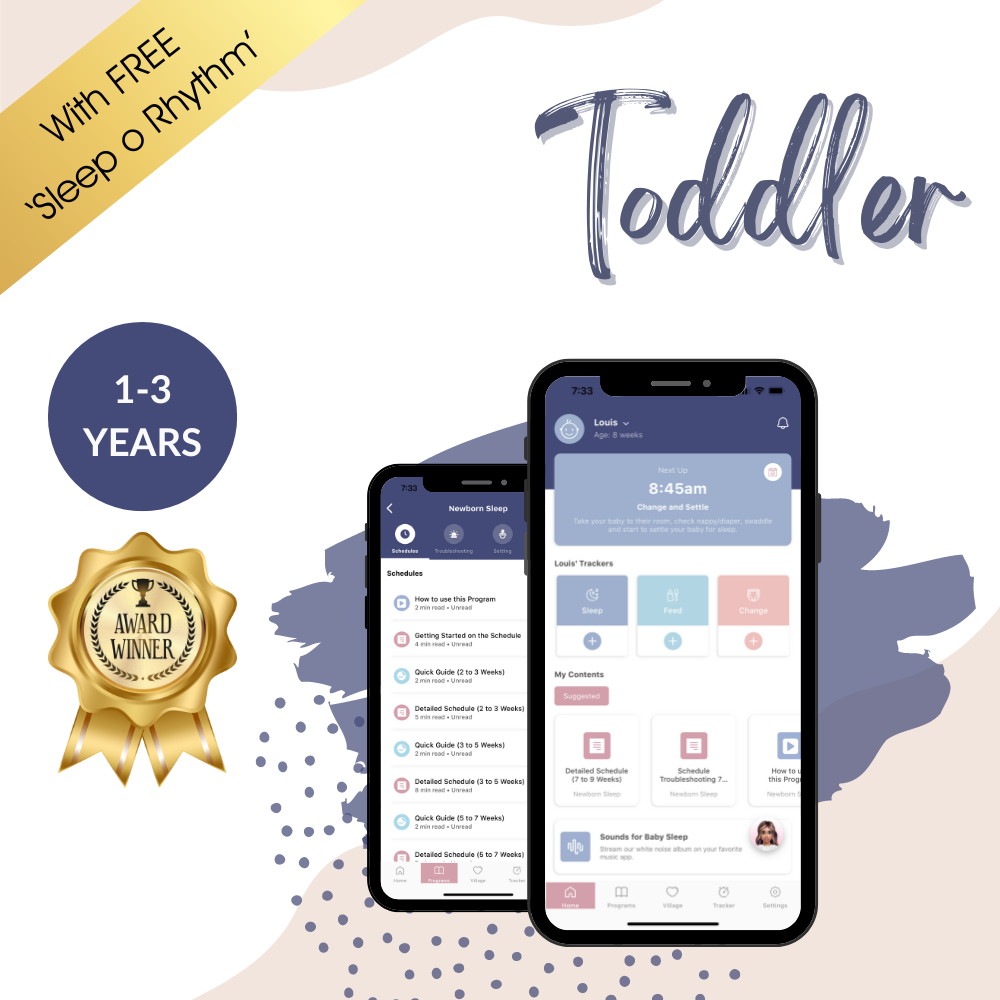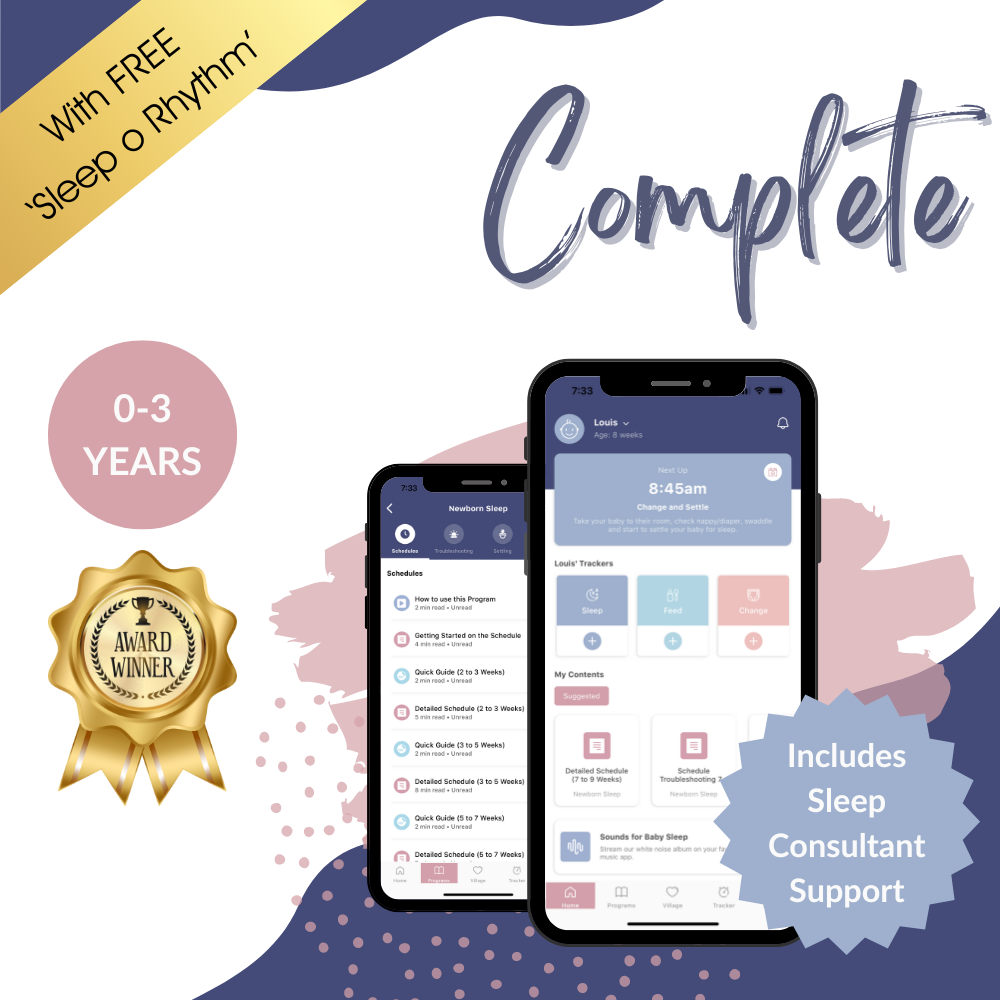
Why 'sleep training' is our LAST resort...
Something we see regularly that we cannot wholeheartedly agree with is the advice around "sleep training" your baby at night only... in complete isolation from their day time naps, without even looking at the total amount of sleep they're having in a 24-hour period, and irrespective of whether the baby is actually fully ready to be sleep trained in the night.
I understand the theory behind this, I do. The justification is that at night, there are a whole raft of sleep hormones working in your favour and your baby's circadian rhythm kicks in, so sleep should be easier to achieve at night than in the day... Yep. For sure. Provided they're actually ready to sleep better at night.
Let me explain what I mean...
The relationship between naps and night sleep
We know there is a really strong link between daytime and night-time sleep. While differentiated in your baby's brain, they are still very intrinsically linked. You will know yourself that if your baby or toddler is extremely overtired they will usually have a lousy night. This of course means your baby then starts the day already overtired, which leads to poor napping and the cycle continues.
Equally, if a baby has too much daytime sleep or naps too late in the day, we know they will naturally sleep less at night because they're simply not tired enough for a full restorative sleep. (Have a read of THIS article for more info on over and under tiredness).
Get your little one’s sleep back on track.
Get guidance, advice & exclusive support through the sleep regressions, nap transitions and big sleep changes to come.
Get our Sleep Programs
It can actually be really tricky to know how much day sleep is appropriate for your little one, as baby sleep is a very fast-changing phenomenon, so the nap pattern your baby had a few weeks ago may no longer be meeting their needs. Our Little Ones App can make things a lot easier though with evolving, age-appropriate nap schedules that help to promote good night sleep.
Sleep training and controlled crying
Now imagine your baby is waking a lot at night and you're at a loss as to why and you're tired and exhausted. You seek some free or paid advice and you're told that you need to start sleep training your baby at night to teach them to sleep through, as their night waking is DEFINITELY a settling issue.
So you do it. I did it, with my eldest. You don't want much crying (no one wants to hear their baby cry!), but you're told it's unavoidable. In this case, it most definitely is! You work on your baby's night waking, using whatever method they've given you - controlled crying, verbal reassurance, check-in methods, pick-up put-down - wondering why your baby is resisting so much, why it's taking hours and hours all night long.
At some point, you give up because it's too stressful on you both OR it does work, eventually, after night upon night of tears and frustration...
BUT no one asked you about your baby's naps during that whole process. No one first tried to see if your baby's night waking was simply caused by too much or too little day sleep. No one tried to tweak their nap hours, (a very easy thing to do, which would have involved no crying or anxiety) just to see if that could make a difference.
Nope - they jumped straight in to diagnosing and "fixing" your baby's night waking in total isolation from their daytime sleep and settling. Your baby could well have been crying during this process, not because they were being "naughty" and refusing to respond to the sleep training, but because they simply weren't tired enough to go back to sleep. Or because they were overtired and the stress hormone cortisol was coursing through their body making it extremely hard for them to settle on their own.
Say goodbye to sleepless nights.
Join over 800,000 families worldwide who are enjoying excellent sleep with our Sleep Programs, created by experts in the field of pediatric sleep.
Get our Sleep Programs
| It is not fair on your baby to expect something of them that they are actually incapable of delivering. No amount of sleep training is going to make your baby sleep if they're physiologically not ready for sleep. Surely that's the first place you should start? |
Sleeping through the night
Eventually your baby probably will "sleep through the night". Or so you think... Because you might not notice the long, silent, wakeful periods in the middle of the night (as a result of their imbalanced napping in the day), but now your baby has learned not to cry out when they wake.
It's all a bit morbid and devastating isn't it?
And I'm sorry but this is something that really tugs at my heartstrings. This is where the bad press about sleep training comes from. This is the kind of thing that ruins it for the rest of us who understand the holistic approach to baby sleep.
And so this is what WE do...
Focus on your baby's naps first
We focus on naps first. It's actually, probably, the primary focus of our company. In fact, we don't ever really push the "sleeping through the night" thing because there are a dozen factors that have to line up for that to happen in the first place and the biggest one of these is getting naps on track. Quite simply, if a baby's naps aren't spot on, sleep training is going to be VERY tricky and a lot more stressful than necessary.
So that's where we start. Our Little Ones App provides you with the perfect nap hours and timings for your baby's age (which are very age specific and ever-changing) and we get that all in place before even looking at nights! Many, many babies will automatically start to sleep a lot better at night simply because their naps are structured to naturally promote good night sleep.
Once the naps are spot on we can begin to look for other reasons for night waking...
A game changer in the world of baby sleep.
Using cutting edge technology, our Sleep-0-Rhythm automatically adjusts your little one's daily schedule based on sleep tracking events to make your life easier and your little one’s sleep schedule more manageable.
Get our Baby Sleep Program
Night waking
This is where a whole raft of factors can be ticked off and ruled out or improved upon. Things like feeding or the introduction of solids, the sleep environment, habit waking (in older babies). It is only after ruling out all of these factors, that we would then move into self-settling and "sleep training" territory. Once we were confident your baby was totally ready and there was nothing like over or under tiredness that could impact their success.
Babies in this situation are far more likely to respond to our gradual settling methods because they are perfectly ready to do so.
Sleep training: the last resort
Sleep training (especially at night) is usually the last bridge we cross with a baby. Sometimes, many times, the answer to your baby's sleep is much much simpler and will involve fewer tears, from your baby and from you.
For older babies though (over 4 months old), working on self-settling can definitely help to get some longer stretches of sleep happening overnight. If your baby relies heavily on a parent-led sleep association (being rocked or fed to sleep or the use of a pacifier are the most common ones), they will need that same method to go back to sleep between cycles overnight. (You can read more about the 4 month sleep regression HERE).
Let's get your little one's sleep sorted ASAP!Our award-winning Sleep Programs will solve your baby's sleep challenges in no time.
Get our Sleep Programs
In this case, teaching your baby to self-settle to sleep is going to give them the best chance at resettling themselves in between sleep cycles overnight. When working on self-settling, we would again recommend focusing on their naps first. Once your baby is able to self-settle at the start of naps and bedtime you should find they start to resettle themselves overnight as well.
So before you embark on “sleep training” your baby, why not take the time to make sure they are actually ready to sleep better at night? Our Little Ones App can help with age-appropriate nap and feed schedules, as well as several gentle methods to guide your little one towards self-settling.
_________
Bibliography
Middlemiss, W., D.A. Granger, W.A. Goldberg, and L. Nathans. Asynchrony of mother-infant hypothalamic-pituitary-adrenal axis activity following extinction of infant crying responses induced during the transition to sleep. Early Hum Dev. 88(4): p. 227-32. 2012.
Burnham, Melissa M et al. “Nighttime sleep-wake patterns and self-soothing from birth to one year of age: a longitudinal intervention study.” Journal of child psychology and psychiatry, and allied disciplines vol. 43,6 (2002): 713-25. doi:10.1111/1469-7610.00076
Goodlin-Jones, B L et al. “Night waking, sleep-wake organization, and self-soothing in the first year of life.” Journal of developmental and behavioral pediatrics : JDBP vol. 22,4 (2001): 226-33.
Gračanin, Asmir et al. “Is crying a self-soothing behavior?.” Frontiers in psychology vol. 5 502. 28 May. 2014, doi:10.3389/fpsyg.2014.00502
St James-Roberts I, Roberts M, Hovish K, Owen C. Video Evidence That Infants Can Resettle Themselves Back to Sleep After Waking in the Night, as well as Sleep for Long Periods, by 3 Months of Age. J Dev Behav Pediatr. 2015 Jun;36(5):324-9. doi: 10.1097/DBP.0000000000000166. PubMed PMID: 26035139; PubMed Central PMCID: PMC4459553.
_________
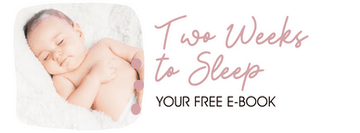
Receive product and services updates, promotional offers and other marketing communications based.


